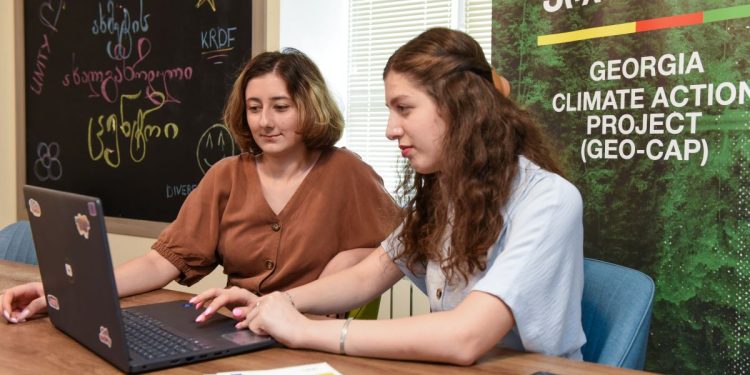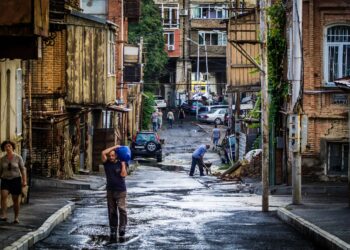In the mountainous regions of Akhmeta Municipality, a pioneering project is helping to instill a deep understanding of renewable energy and climate change in the local youth. Spearheaded by Natia Pilashvili, a representative from AAIP Matani XXI, the project aims to popularize the use of renewable energy resources in schools while raising awareness about the importance of sustainable environmental practices. The initiative, supported by CENN and funded by the European Union, brings both local and international expertise together to create lasting change. According to Pilashvili, the initiative was born out of a simple yet powerful idea: “Students should not only hear about climate change theoretically, but they should also see and experience renewable energy in practice.”
The Project’s Core Objectives
At the heart of the project is the goal to popularize renewable energy resources in schools, with a specific focus on solar energy, as well as to raise awareness about the urgent need to address climate change. Pilashvili highlights the importance of involving students in this educational process from a young age: “Our school system, alongside families, plays a crucial role in shaping the next generation. Teaching them about renewable energy and climate change is essential to their future—and to the future of the planet.”
The project, which is part of a broader effort supported by CENN and funded by the European Union, involved several key activities designed to make renewable energy more accessible and practical in local schools. These included thematic training sessions, the installation of solar panels, and an art competition focused on climate change.
Training the Next Generation on Climate Change
A significant aspect of the project was the thematic training conducted at Matani Public School No. 1, which brought together 20 enthusiastic young participants. Pilashvili explains, “We focused on climate change, its global challenges, and the actions we can take to address it. It was important that students understood how to mitigate climate change and adapt to its impacts. These sessions were not just about talking—they were about doing.”
The training covered topics like international climate policies, the role of renewable energy, and the science behind climate change. Practical activities were also incorporated into the curriculum to ensure that the lessons were engaging and memorable.

Solar Energy in Action: Installing Solar Panels in Schools
One of the standout features of the project was the installation of solar panels in five schools across the municipality, including those in remote villages. This move allowed the schools to reduce their reliance on traditional electricity sources, demonstrating the practical application of renewable energy. Pilashvili emphasizes the significance of these installations, saying, “By introducing solar panels in our schools, we are not just reducing the schools’ energy costs. We are showing students that renewable energy works. It’s not just a concept—they are witnessing it in their own classrooms.”
As part of this initiative, ten outdoor lighting lamps powered by solar panels were installed, further demonstrating the viability of renewable energy in daily life. Schools involved in the project signed a memorandum of understanding, committing to the maintenance of the solar panels and ensuring their long-term use.
Engaging Students Through Art
To further engage students, the project launched an art competition with the theme “Climate Change Through My Eyes.” The competition included categories for drawings, photography, and posters, allowing students from grades 9 to 11 to creatively express their understanding of climate change and its impact on their local environment.
Pilashvili noted, “The students’ submissions were truly powerful. They were able to express the issues they face in their own communities through art. It was a compelling way for them to connect with the topic on a personal level.”
The winners in each category were awarded solar-powered robots, offering them a fun and educational way to interact with renewable energy technologies. The competition not only sparked students’ creativity but also reinforced the message that renewable energy solutions can have a direct, positive impact on their lives.
International Collaboration and Knowledge Sharing
An international element added depth to the project when an expert from the Netherlands, Sebastian Hendrik Sterl, joined the project’s summary meeting online. With years of experience in renewable energy, particularly in solar power, Sterl shared valuable insights and real-world examples from European countries that have successfully integrated solar energy into their communities.
“The experience shared by Sebastian was invaluable,” Pilashvili remarks. “It opened the eyes of our students and teachers to the global scale of renewable energy adoption, showing them that our small steps here in Akhmeta are part of a larger movement toward a sustainable future.”
A Summary Meeting and Continued Engagement
The project culminated in a summary meeting held at the Akhmeta Technopark, where the participants of the art competition, along with other project partners, came together to reflect on the outcomes. During this event, the project manager presented a detailed overview of the initiative’s achievements, including the solar panel installations and the art competition results.
The meeting also featured a workshop on Calliope, a tool designed to address climate change issues through interactive learning. “This workshop was an excellent opportunity for students to explore innovative ways to engage with climate change solutions,” says Pilashvili.
The event was attended by 25 participants, including local school representatives, project partners, and students. Certificates were awarded to art competition winners, further recognizing the students’ commitment to raising awareness about climate change.
Moving Forward: Expanding the Project
Given the overwhelming success of the project and the high level of interest from other schools in the region, Pilashvili is excited about expanding the initiative. “The response has been incredible. Schools across the municipality have expressed interest in implementing similar projects, and we are eager to scale this up. Our goal is to spread these workshops and competitions throughout the entire region, inspiring even more students to engage with renewable energy solutions.”
As the project progresses, Pilashvili envisions a future where renewable energy education becomes an integral part of the curriculum in all public schools. “If we want to truly make a difference in the fight against climate change, we need to empower the next generation with the knowledge and tools they need to lead the way.”
Through its multifaceted approach, the project in Akhmeta Municipality is proving that education can be a powerful tool for change. By combining training, hands-on projects, and creative engagement, the initiative is helping to cultivate a generation of environmentally-conscious citizens who not only understand the science of climate change but also know how to take meaningful action.
As Pilashvili reflects, “This project is not just about teaching students—it’s about inspiring them to act. We want to see them grow up as leaders who embrace sustainable energy solutions, ensuring a greener future for us all.”
This initiative, made possible through the support of CENN and the European Union, is a clear example of how local efforts, supported by international partnerships, can lead to a sustainable and impactful future.
Since 2021, CENN has been implementing the four-year Georgia Climate Action Project, funded by the European Union and carried out in partnership with the Kakheti Regional Development Foundation (KRDF), the Chiatura Union (ACU), the Association for Agrotourism Development of Racha-Lechkhumi and Kvemo Svaneti (RLS-ADA), and the Young Pedagogues’ Union (YPU).
The project aims to strengthen civil society and promote human rights in four target regions of Georgia—Guria, Imereti, Kakheti, and Racha-Lechkhumi and Kvemo Svaneti. Its focus is on ensuring the right to access clean water and a healthy environment while enhancing civil society’s role in shaping and implementing climate change policies.
As part of the initiative, CENN launched a competition to identify innovative ideas for climate change mitigation and adaptation. One of the winners, AAIP Matani XXI, was awarded €9,000 to support its efforts.














